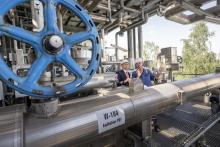They have set themselves a big goal: a team of researchers and industry professionals wants to produce 380,000 litres of "green" petrol in Freiberg by 2026. From October to December 2023, the consortium, which includes the TU Bergakademie Freiberg and CAC ENGINEERING GMBH from Chemnitz, was able to produce a further 55,000 litres of the sustainable synthetic fuel in Freiberg.
With the production of the fuel over the planned period from 2023 to 2026, the project aims to demonstrate that up to 90 per cent CO2 savings are possible with the help of a carbon cycle. The joint project "Demonstrating a Circular Carbon Economy in Transport along the Value Chain" - DeCarTrans for short - is funded by the Federal Ministry for Digital and Transport Affairs (BMDV).
Collaboration with industry in Saxony
The sub-project of TU Bergakademie Freiberg, which is funded with 12.78 million euros, is being realised in close collaboration with the technology provider CAC ENGINEERING. The collaborative research project aims to demonstrate the long-term viability of the technology for producing synthetic petrol (also known as e-fuel or "green" petrol). The second DeCarTrans test campaign from October to December 2023 was a decisive step on the way to proving this continuous operation capability. The demonstration plant was operated continuously and trouble-free for a total of nine weeks. In the run-up to the second test campaign, the demonstration plant was slightly modified. With a new distillation column, higher aromatics, which can form soot particles when used in engines, can now be separated from the product petrol much more effectively, resulting in a significant improvement in petrol quality.
Continuous production
By 2026, 380,000 litres of petrol are to be produced, which will then be made available to the project partners for fuel tests and extensive vehicle tests. In the course of the project to date, an initial 15,000 litres have been produced from biomethanol, a by-product of the paper industry, since January 2023, and now 55,000 litres of petrol in the second stage.
The large-scale test facility for synthetic petrol was the first and largest of its kind in Germany to be built by CAC at the TU Bergakademie Freiberg in 2009. The current DeCarTrans joint project, which is funded by the BMDV, makes it possible to operate the petrol synthesis in continuous use and provide fuels in sufficient quantities for demonstration purposes. The aim is also to prove that synthetic fuels can make a significant contribution to achieving climate targets. Representatives from politics, NGOs and the public will be shown with this demonstration that "green" fuels can reduce climate-damaging emissions.
About the DeCarTrans research project

In addition to TU Bergakademie Freiberg and CAC ENGINEERING GmbH, the funded partners of the Demonstrating a Circular Carbon Economy in Transport Along the Value Chain (DeCarTrans) project include FEV Europe GmbH, Lother GmbH, Coryton Advanced Fuels Deutschland GmbH and Forschungszentrum Jülich GmbH. Other companies from the automotive and mineral oil industries are supporting the project as associated partners.
The DeCarTrans project is being funded by the Federal Ministry for Digital and Transport Affairs with a total of 14.93 million euros as part of the overall concept for renewable fuels. The funding guideline for the development of renewable fuels is coordinated by NOW GmbH and implemented by the project management organisations VDI/VDE Innovation + Technik GmbH and Fachagentur Nachwachsende Rohstoffe e. V.
Background
What are e-fuels?
E-fuels are liquid fuels produced synthetically using renewable electricity that can be used to power cars (1.2 billion worldwide), lorries, aircraft, ships or heating systems - anything with an internal combustion engine - in a climate-friendly way. If e-fuels are used in their pure form, CO2 emissions can be reduced by up to 90 per cent compared to mineral fuels. In addition, e-fuels can be made available nationwide via the existing petrol station network and can be stored and transported.
Another advantage of methanol-based e-fuel processes is that the methanol can be produced at locations where renewable electricity is available in abundance as a key "raw material" and is therefore cheap. This ensures that large quantities of renewable energy can be imported to Germany and Europe in order to sustainably cover energy requirements in the long term.
The drop-in-capable synthetic petrol produced from bio-methanol in the DeCarTrans project meets the requirements of the DIN EN 228 standard as an E10 blend, is registered under REACH and can directly replace conventional fossil fuel or be blended with it - without any technical modifications to the vehicle. In an industrial plant, production costs of less than 1 euro per litre could already be achieved today.
About CAC
Reliable, experienced and human, CAC is a leading international plant engineering company in the field of process and chemical engineering. In the business areas of chlor-alkali electrolysis, sustainable power-to-X solutions, hydrocarbon technologies and the chemical industry, CAC offers the entire range of services of an engineering and plant construction company. CAC has been developing synthetic fuels since 2008 and has built Europe's largest demonstration plant for the production of synthetic petrol in Freiberg.
With around 400 employees, 270 at the company headquarters in Chemnitz, CAC has built over 500 industrial plants worldwide in more than 55 years. For more information about CAC ENGINEERING GMBH, please visit: www.cac-chem.de
Apply practical knowledge during your studies
Students at TU Bergakademie Freiberg benefit from current, application-oriented research: In degree programmes such as Process Engineering and Chemical Engineering (Diploma) or Engineering (Bachelor), for example, they learn how to produce sustainable fuel from agricultural residues. They can apply their knowledge in practice at the university's unique demonstration facilities. This makes graduates sought-after experts in economical and climate-neutral conversion technologies. Many go on to work in industry and contribute their knowledge to companies such as CAC to drive forward the technologies of the future.
